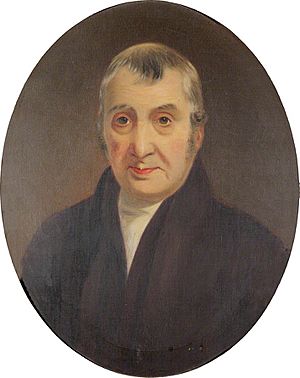John Fell (tutor) facts for kids
John Fell (born August 22, 1735, in Cockermouth – died September 6, 1797, in Homerton Academy) was an English minister and teacher. He was a congregationalist, which means he belonged to a type of Protestant church where each local church is independent and makes its own decisions. He was also a classical tutor, teaching subjects like ancient languages and history.
Contents
John Fell's Early Life and Education
John Fell was born in Cockermouth, a town in Cumberland, England, on August 22, 1735. His father, Daniel Fell, was a schoolmaster. He also worked as a clerk for the local non-Church of England congregation and sometimes preached in villages.
John Fell first learned the trade of a tailor. After finishing his apprenticeship, he found work in London. However, he was very interested in becoming a minister for a non-Church of England church. With help from a group called the King's Head Society, he began studying at the Mile End academy in 1757.
At the academy, he was taught by Dr. John Conder. His classical tutor, Dr. John Walker, was a great scholar. Dr. Walker really liked John Fell and gave him extra lessons.
Becoming a Minister and Teacher
After leaving the academy, John Fell worked briefly as an assistant at a school in Norwich. In 1762, he was asked to lead an independent church in Beccles, Suffolk. He preached there for several years. However, he didn't officially become their pastor because the church wasn't set up in a way he liked.
In May 1770, he became the minister of the congregational church in Thaxted, Essex. He was officially ordained there on October 24. This was a very happy time for him. His church grew, and he got along well with the local rectors (Church of England priests). He also became friends with Rayner Hickford, a scholar who studied the old Saxon language.
John Fell had plenty of time for writing, studying theology (the study of religious beliefs), and teaching private students. One of his young students was Richard Sharp. They became lifelong friends. Richard Sharp even wrote the introduction for Fell's book, An Essay towards an English Grammar, which came out in 1784.
Challenges at Homerton Academy
In 1787, John Fell took on a new role. He became the classical tutor at his old school, Homerton Academy, after Dr. Benjamin Davies retired. He moved to Homerton in September 1789.
However, it soon became clear that John Fell had trouble getting along with his students. Some people said there were already problems with students not following rules before he arrived. Things got worse, and by June 1795, during the yearly exams, many complaints were made by both sides.
After a lot of discussion, the academy's leaders decided in March 1796 that John Fell should retire. His friends protested this decision, but their protest was not officially recorded. John Fell left the academy at the end of January 1797. John Berry took over his teaching position.
John Fell likely had a difficult personality. Some people didn't like his very strict religious views. Others were upset by his strong political beliefs about how governments should be run.
Even after leaving the academy, John Fell was supported. A London merchant helped him get a yearly income of £100. A group of eight laymen (people who are not ministers) also raised about £200 for him. This money was for him to give a series of twelve lectures about the evidence for Christianity.
John Fell gave four of these lectures to large crowds in the Scots Church in London. But then his health failed. He passed away on September 6, 1797, in Homerton. He was never married. He was buried at Bunhill Fields on September 15. A speech was given at his funeral by Joseph Brooksbank. A funeral sermon was preached by Dr. Henry Hunter on September 24.
John Fell's Writings and Ideas
John Fell wrote several books and essays during his lifetime. Here are some of his notable works:
- Confession of Faith, published in 1770.
- Essay on Love of one's Country, an essay about patriotism.
- Genuine Protestantism, &c., published in 1773. These were three letters discussing religious beliefs.
- The Justice … of the Penal Laws … examined, &c., published in 1774.
- A Fourth Letter … on Genuine Protestantism, &c., published in 1775. This was a reply to another writer, Dr. Joshua Toulmin.
- Dæmoniacs. An Enquiry, &c., published in 1779. This book argued against the ideas of Hugh Farmer.
- "Remarks on the Appendix of the Editor of Rowley's Poems", published in Hickford's Observations, &c., in 1782.
- An Essay towards an English Grammar, &c., published in 1784.
- The Idolatry of Greece and Rome, &c., published in 1785. This was another book arguing against Hugh Farmer's views.
- Lectures on the Evidences of Christianity, &c., published in 1798. This book contained the lectures he was giving before he passed away. Henry Hunter finished the course of lectures.
Henry Hunter also mentioned that John Fell wrote reviews of other books. These included Horne Tooke's Diversions of Purley (1786) and Nicholas Savary's 'Letters on Egypt' (1786). It's not known where these reviews were published.
 | Emma Amos |
 | Edward Mitchell Bannister |
 | Larry D. Alexander |
 | Ernie Barnes |


